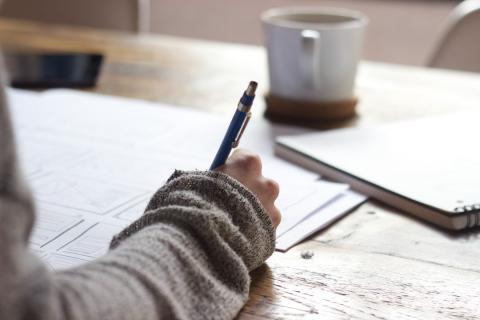8 Effective Study Habits to Boost Your Grades
Jan 17,2019
The only thing getting in the way of awesome grades is you. Your study habits can make or break your report card this semester.
So, how do you study? Do you study the same way as your peers?
If you're unsatisfied with your grades, you can probably improve your study habits. Everyone is different so different habits work for different people. Once you know what works for you, you'll be rolling in A's.
There are 8 simple steps to improving your study habits. Keep reading to find out what they are and how to boost your grades.
1. Plan Ahead and Get Ahead
Students with killer marks are usually excellent planners. They're organized and ahead of every deadline. If organization doesn't come naturally to you, now's the time to work on it.
Get a planner that has both a daily and a monthly section. Weekly spreads are great because you can plan the whole week in advance.
Enter in all your due dates. These don't have to be teacher-imposed due dates only. Include your own due dates for understanding each concept.
Plan what you're going to study each day well in advance. Include how long you'll study and the exact material you'll cover. Start studying as soon as you know the due date.
Cramming is not going to get you awesome grades. The trick is being prepared and organized. The day of the exam, you'll be so well-versed in the material, it'll be a breeze.
2. Review Before Creating
Essays and assignments make a lot of students nervous. Your nerves cause you to put off working on it, and then you end up cramming.
You need to review your class notes before starting any assignment or project. It gets you in the mindset of the material. It also reminds you of the things the teacher pointed out as important during class.
Doing a thorough review will make you feel more comfortable and less nervous. You'll approach the assignment with confidence because the content feels familiar.
Always clarify class notes with the teacher if you don't understand. Make sure the material is clear before you start creating the project.
3. Learn How You Learn
Did you know that how your friends study might not work for you? Everyone learns differently.
Visual learners study best from diagrams, charts, and maps. If this is you, create a mind map of different concepts and related ideas.
Audio learners learn best from verbal dictation and recordings. Try reading your textbook out loud, recording your voice, and re-listening to it.
Tactile learners study best by using their hands. This might mean making flashcards and flipping them over to test your memory. Try to do physical activity while studying, like walking on a treadmill.
Once you understand how you learn, you can tailor your study habits to fit.
4. Remove Distractions
Where do you do the bulk of your studying? Your environment strongly affects your mental state. Studying somewhere that you sleep and relax won't feel motivating or energizing.
Pick a study location you can use only for studying. When you sit in this place, you know it's time to focus.
Remove any distractions from your study space. Turn off your phone notifications. Put away books, games, and entertainment.
5. Set Goals for Studying
Each study session you plan needs to have a goal. You can decide this a week in advance and then alter it the day of, if need be.
For example, your goal might be to get through chapter four in three hours of studying. By the end of this time block, your goal should be to understand everything about chapter four.
If you're working on an assignment, break it up into smaller chunks. Your goal for this study session could be to complete chunks one and two of your project.
Setting goals helps you feel motivated and focused.
6. Use Study Groups Wisely
Study groups can be great tools for understanding material better. But, sometimes they're more distracting than useful. Commit to study groups wisely.
Do you study better alone or with peers nearby? If you need quiet without distractions, working along might be best. Limit study group sessions to brainstorming ideas or gaining a new understanding.
If you thrive on interaction when studying, embrace study groups. Use them to teach each other concepts and quiz each other.
The trick is to be intentional with your study habits. Don't join a study group because your friends are there; have a purpose!
7. Energy is a Tool
Staying energized is a serious concern for students. You wake up early for class and go to an after-school job. Then, you stay up late to do homework.
Since getting more sleep isn't always a viable option, you need to learn how to spend your energy.
When are you most energized during the day? For many people, it's first thing in the morning after a cup of coffee. Use your highest energy time to do the hardest work.
Tasks that are easier to do require less energy. It's all about being strategic with your time and focus. Drink cold water as you study between coffees to keep your systems alert.
8. Practice Self Care
Burnout is a common condition for stressed-out students. Staying on top of all your classes can make you feel overwhelmed and irritable.
It's crucial that you maintain your health and schedule self-care. Take ten minutes to put on a face mask or play a video game. Reward each study session with a texting break or social media scroll.
Write down a handful of affirmations and read them out loud every day. Things like "I can do this" and "I will ace this test" put your mindset in a productive place.
Want More Helpful Study Habits?
There's more to studying than simply reading the textbook. Each person has their own unique learning style. Once you learn how you learn best, you can cash in on that knowledge.
Follow the study habits above to take your grades to the next level. It's all about getting organized, focused, and informed on the best study habits.
For more information on improving your academic career, check out our Help Center.






